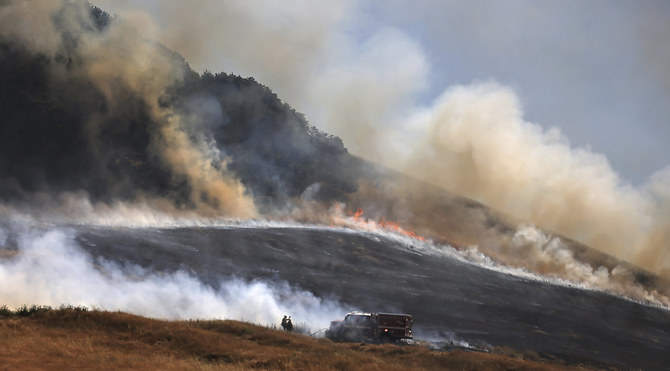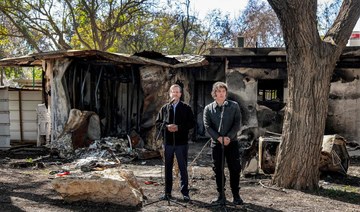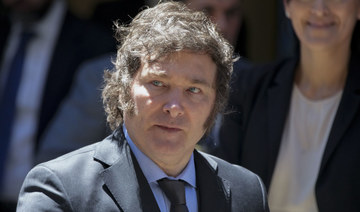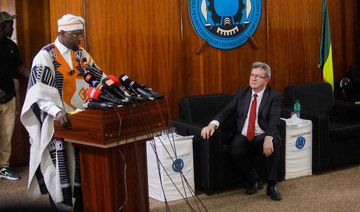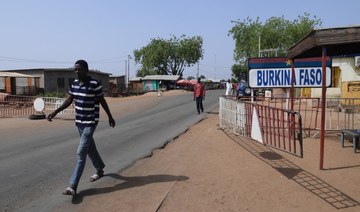The planet’s temperature spiked on Tuesday to its hottest day in decades and likely centuries, and Wednesday could become the third straight day Earth unofficially marks a record-breaking high. It’s the latest in a series of climate-change extremes that alarm but don’t surprise scientists.
The globe’s average temperature reached 62.9 degrees Fahrenheit (17.18 degrees Celsius) on Tuesday, according to the University of Maine’s Climate Reanalyzer, a common tool based on satellite data, observations, and computer simulations and used by climate scientists for a glimpse of the world’s condition. On Monday, the average temperature was 62.6 degrees Fahrenheit (17.01 degrees Celsius), setting a record that lasted only 24 hours.
For scientists, it’s a sweaty case of I-told-you-so.
“A record like this is another piece of evidence for the now massively supported proposition that global warming is pushing us into a hotter future,” said Stanford University climate scientist Chris Field, who was not part of the calculations.
On Wednesday, 38 million Americans were under some kind of heat alert, said National Oceanic and Atmospheric Administration chief scientist Sarah Kapnick. She said the global heat is from a natural El Nino warming of the Pacific that heats up the planet as it changes worldwide weather on top of human-caused climate change from the burning of coal, oil and gas.
Even normally cooler communities are feeling the heat. In North Grenville, Ontario, the city turned ice-hockey rinks into cooling centers as temperatures Wednesday hit 90 degrees Fahrenheit (32 degrees Celsius), with humidity making it making it feel like 100.4 degrees (38 degrees Celsius).
“I feel like we live in a tropical country right now,” city spokeswoman Jill Sturdy said. “It just kind of hits you. The air is so thick.”
The record highs are unofficial but significant
University of Maine climate scientist Sean Birkle, creator of the Climate Reanalyzer, said the daily figures are unofficial but a useful snapshot of what’s happening in a warming world. Think of it as the temperature of someone who’s ill, he said: It tells you something might be wrong, but you need longer-term records to work like a doctor’s exam for a complete picture.
While the figures are not an official government record, “this is showing us an indication of where we are right now,” said National Oceanic and Atmospheric Administration chief scientist Sarah Kapnick. And NOAA indicated it will take the figures into consideration for its official record calculations.
Even though the dataset used for the unofficial record goes back only to 1979, Kapnick said that given other data, the world is likely seeing the hottest day in “several hundred years that we’ve experienced.”
Scientists generally use much longer measurements — months, years, decades — to track the Earth’s warming. But the daily highs are an indication that climate change is reaching uncharted territory.
Just how hot is it?
With many places seeing temperatures near 100 degrees Fahrenheit (37.8 degrees Celsius), the new average temperatures might not seem very hot. But Tuesday’s global high was nearly 1.8 degrees Fahrenheit (a full degree Celsius) higher than the 1979-2000 average, which already tops the 20th- and 19th-century averages.
High-temperature records were surpassed this week in Quebec and Peru. Beijing reported nine straight days last week when the temperature exceeded 95 degrees Fahrenheit (35 degrees Celsius). Cities across the US from Medford, Oregon, to Tampa, Florida, have been hovering at all-time highs, said Zack Taylor, a meteorologist with the National Weather Service.
Alan Harris, director of emergency management for Seminole County, Florida, said that they’ve already exceeded last year in the number of days they’ve had their extreme weather plan activated, a measure initiated when the heat index will be 108 degrees Fahrenheit (42.22 degrees Celsius) or greater.
“It’s just been kind of brutally hot for the last week, and now it looks like potentially for two weeks,” Harris said.
In the US, heat adviseries include portions of western Oregon, inland far northern California, central New Mexico, Texas, Florida and the coastal Carolinas, according to the National Weather Service Weather Prediction Center. Excessive heat warnings are continuing across southern Arizona and California.
Some populations are at risk
Higher temperatures translate into brutal conditions for people all over the world. When the heat spikes, humans suffer health effects — especially young and elderly people, who are vulnerable to heat even under normal conditions.
“People aren’t used to that. Their bodies aren’t used to that,” said Erinanne Saffell, Arizona’s state climatologist and an expert in extreme weather and climate events. “That’s important to understand who might be at risk, making sure people are hydrated, they’re staying cool, and they’re not exerting themselves outside, and taking care of those folks around you who might be at risk.”
Overall, the heat means something a little different to everyone.
In West Texas, it’s cool wraps and Gatorade for construction workers, said Joe Staley, a job site superintendent for a company that builds wastewater treatment plants. In Portland, it’s extra water on backyard vegetable gardens, said Martha Alvarado. In Minnesota, it’s a difficult workout on the family vineyard thanks to extra humidity for Joe Roisen.
In Dallas, the heat also means a sense of camaraderie for musician Sam Cormier, who often plays outdoors. Apartment dwellers with their windows open step out to bring him a drink. People are still walking around outside, even with the weather, and he plays with just his guitar, which is lighter than other equipment. He’d rather be outside sweating, he said, than inside on a computer.
How we got here, and where we're going
NOAA’s Kapnick said the global heat is from a natural El Nino warming of the Pacific that heats up the globe as it changes worldwide weather on top of human-caused climate change from the burning of coal, oil and gas.
“Not all records are meant to be broken. In almost every corner of our planet, people are facing the brunt of unprecedented heat waves,” said United Nations Environment Programme Director Inger Andersen. “We ignore science at our own peril. ... It is the poorest and most vulnerable that continue to suffer from our inaction.”
The highs come after months of “truly unreal meteorology and climate stats for the year,” such as off-the-chart record warmth in the North Atlantic, record low sea ice in Antarctica and a rapidly strengthening El Nino, said University of Oklahoma meteorology professor Jason Furtado.
Wednesday may bring another unofficial record, with the Climate Reanalyzer again forecasting record or near-record heat. Antarctica’s average forecast for Wednesday is a whopping 4.5 degrees Celsius (8.1 degrees Fahrenheit) warmer than the 1979-2000 average.
Because humanity hasn’t stopped pumping heat-trapping gases into the air, future generations will look back at the summer of 2023 as “one of the coolest of the rest of your life,” said Texas A&M climate scientist Andrew Dessler.








